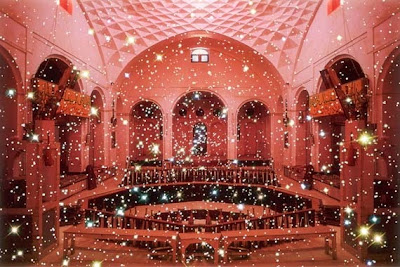Photo by Vinay Khare
Ganesha became the Doorkeeper since birth. It is a well-known legend that Parvati has created her son, whom she wished to act as guardian at the door to her chambers. In thwarting his father's entrance therein, Ganesha initially became an obstruction to him, and acquired his remarkable head in this first battle. In my humble opinion, this magic incident has the deepest esoteric character. After that, Lord Ganesha continues to carry out the guardian functions. For example, He protects the Vishwanath temple and the entire Kashi region. 56 Vinayakas of Kashi are established in seven fold configuration in all eight directions of space (and this seven has eight constituents in each). His glory of protector and remover of obstacles continues today, and his images are commonly found at the entrance to homes. But his secrets do not open so simply. Sri Ganesha not only destroys stumbling-blocks, he also creates them and places them in the path of the seeker. Thus He is not only the Doorkeeper, but also the key which can open the door. He indicates the way but not easily and for he is as complicated and obfuscating. Ganapati's methods are never obvious.
Known association with Ganesha and muladhara chakra is attested to in the Ganesha’s Atharvashirsha
Tvam muladhara sthitosi nityam
Lord Ganesha! You always dwell in muladhara chakra
This chakra is the principle on which the manifestation or outward expansion of primordial Force rests.
It lies at the bottom of the chakras, the place of elimination and the entrance to the Path upward.
So, Ganesha performs this role as guardian here when he rules our material life, where our spiritual pilgrimage starts. Bridging heaven and earth in this way, Ganesha is the link between divine and worldly wisdom.Seated at the gateway to liberation, he is invincible and relentless Doorkeeper showing the Path.
OM GANESHAYA NAMAHA











